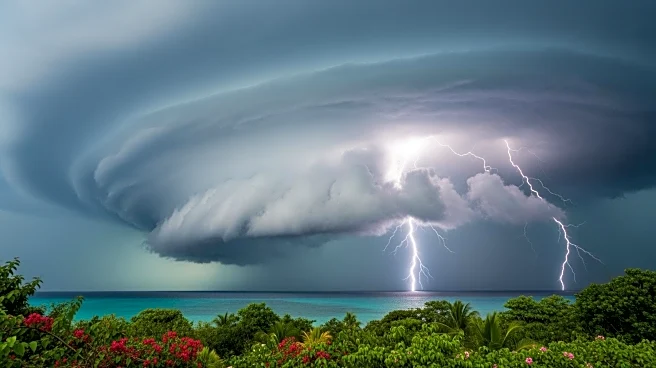What's Happening?
Hurricane Melissa has intensified to a Category 3 storm and is expected to become the strongest hurricane ever recorded in Jamaica. The National Hurricane Center forecasts that Melissa could reach Category 5
status within 48 hours, with sustained winds of at least 157 mph. Jamaican officials have issued warnings, urging residents to take precautions as the storm approaches. The country's National Emergency Operations Centre has been activated, and all airports in Jamaica are set to close. The storm is predicted to bring catastrophic flash floods and landslides, with dangerous waves and a life-threatening storm surge along Jamaica's southern coast. In Haiti, the storm has already caused fatalities and significant disruptions, with evacuations underway in Cuba.
Why It's Important?
The intensification of Hurricane Melissa poses a significant threat to the Caribbean region, particularly Jamaica and Haiti. The potential for catastrophic flooding and landslides could lead to widespread damage and loss of life. The economic impact on these regions could be severe, affecting tourism, infrastructure, and local economies. The storm's progression is being closely monitored by international agencies, highlighting the need for effective disaster preparedness and response strategies. The situation underscores the vulnerability of island nations to extreme weather events, which are becoming increasingly frequent and intense due to climate change.
What's Next?
As Hurricane Melissa approaches, emergency response teams in Jamaica and Haiti are preparing for the storm's impact. Jamaica's government has activated regional shelters and emergency operations centers, while Cuba has ordered evacuations in vulnerable areas. The U.S. Naval Station Guantanamo Bay is also taking precautionary measures. The storm's slow movement increases uncertainty, and residents are advised to stay informed and take necessary precautions. The National Hurricane Center will continue to provide updates as the storm progresses, and international aid may be required to assist affected regions in recovery efforts.
Beyond the Headlines
The intensification of Hurricane Melissa highlights the broader implications of climate change on weather patterns and the increased frequency of severe storms. The Caribbean region's vulnerability to such events necessitates improved infrastructure and disaster preparedness. The storm also raises ethical considerations regarding the responsibility of developed nations to support climate resilience efforts in vulnerable regions. Long-term shifts in global weather patterns could lead to more frequent and intense hurricanes, necessitating international cooperation and investment in sustainable solutions.









